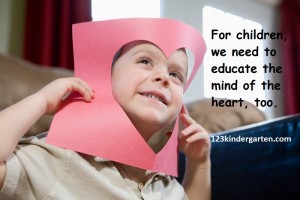Where is the Mind, Anyway?
Last week, I heard an interview with Sam Keane, author of a new book called “The Tale of The Dueling Neurosurgeons.” In his book, he explains that for much of history, the mind was considered to be located not within the brain but within the heart. Unfortunately, it seems that we have gone to the other extreme, so that the mind is now locked in the brain. We do not recognize that the rest of the body has anything to do with thinking.
 Scientists need to watch young children to see how they think with their whole bodies. As babies learn to reach, their eyes certainly focus on the prize but their hands and arms seem to have their own ideas. Toddlers and preschoolers do not always know what their bodies are doing and are surprised when they get in trouble. As a matter of fact, sometimes as adults we find we’ve walked somewhere totally unexpected and say, “My feet just seemed to have a mind of their own.”
Scientists need to watch young children to see how they think with their whole bodies. As babies learn to reach, their eyes certainly focus on the prize but their hands and arms seem to have their own ideas. Toddlers and preschoolers do not always know what their bodies are doing and are surprised when they get in trouble. As a matter of fact, sometimes as adults we find we’ve walked somewhere totally unexpected and say, “My feet just seemed to have a mind of their own.”
Children often use the learning strategy of imitating. When kids imitate their parents, they copy their actions with their bodies but are unaware of the thoughts. Kids often repeat exactly what another child is saying, as if by copying the words they can figure out what the other child means.
The heart has its own way of thinking, too. Have you ever had your heart tell you one thing and your head tell you the opposite? The expression for that situation is torn in two or being of two minds, one mind in the brain and one in the heart.
When it comes to kids, we need to make sure we honor the ‘mind of the heart’. They need to know the words for emotions, especially happy, sad, angry, and scared. It’s helpful for them to talk about their feelings, like feeling ready to explode or tummy all twisted up. They may have their own descriptions such as feeling all empty inside, or tight like an elastic band. Their feelings can support or block learning.
For a play-of-the-day, use some words for emotions and feelings. Maybe make faces at each other and guess what the other person is thinking. You can give your child a mirror for making silly faces. In the words of Aristotle, “Educating the mind, without educating the heart, is no education at all.” Or, maybe that should be educate the minds of the brain, heart, and body? What—and where—do you think?
